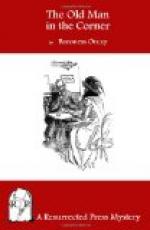“You remember that it was Percival who remained beside his father and carried him up to his room. Where was Murray throughout that long and painful day, when his father lay dying—he, the idolised son, the apple of the old man’s eye? You never hear his name mentioned as being present there all that day. But he knew that he had offended his father mortally, and that his father meant to cut him off with a shilling. He knew that Mr. Wethered had been sent for, that Wethered left the house soon after four o’clock.
“And here the cleverness of the man comes in. Having lain in wait for Wethered and knocked him on the back of the head with a stick, he could not very well make that will disappear altogether. There remained the faint chance of some other witnesses knowing that Mr. Brooks had made a fresh will, Mr. Wethered’s partner, his clerk, or one of the confidential servants in the house. Therefore a will must be discovered after the old man’s death.
“Now, Murray Brooks was not an expert forger, it takes years of training to become that. A forged will executed by himself would be sure to be found out—yes, that’s it, sure to be found out. The forgery will be palpable—let it be palpable, and then it will be found out, branded as such, and the original will of 1891, so favourable to the young blackguard’s interests, would be held as valid. Was it devilry or merely additional caution which prompted Murray to pen that forged will so glaringly in Percival’s favour? It is impossible to say.
“Anyhow, it was the cleverest touch in that marvellously devised crime. To plan that evil deed was great, to execute it was easy enough. He had several hours’ leisure in which to do it. Then at night it was simplicity itself to slip the document under the dead man’s pillow. Sacrilege causes no shudder to such natures as Murray Brooks. The rest of the drama you know already—”
“But Percival Brooks?”
“The jury returned a verdict of ‘Not guilty.’ There was no evidence against him.”
“But the money? Surely the scoundrel does not have the enjoyment of it still?”
“No; he enjoyed it for a time, but he died, about three months ago, and forgot to take the precaution of making a will, so his brother Percival has got the business after all. If you ever go to Dublin, I should order some of Brooks’ bacon if I were you. It is very good.”
CHAPTER XXIV
AN UNPARALLELED OUTRAGE
“Do you care for the seaside?” asked the man in the corner when he had finished his lunch. “I don’t mean the seaside at Ostend or Trouville, but honest English seaside with nigger minstrels, three-shilling excursionists, and dirty, expensive furnished apartments, where they charge you a shilling for lighting the hall gas on Sundays and sixpence on other evenings. Do you care for that?”
“I prefer the country.”




